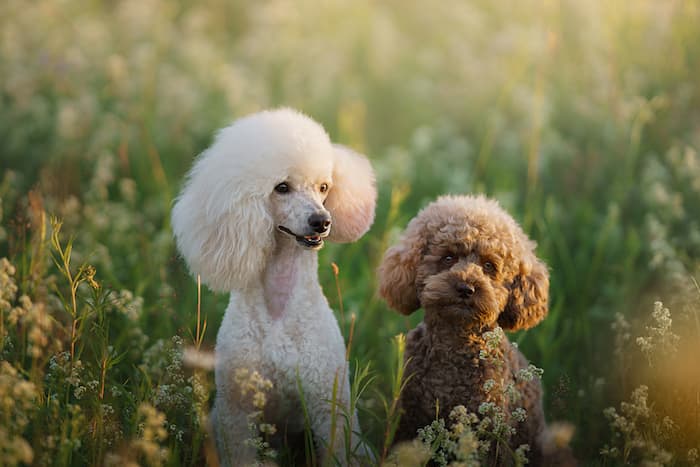Whether toy, miniature, or standard, all Poodle size variations exhibit remarkable similarities in temperament. Ranked No. 2 most intelligent dog behind the Border collie, the Poodle is a fast learner and extremely loyal and obedient. Poodles are also playful, commonly engaging in clownish antics. Their silliness comes with a certain elegance and dignity. On top of their cleverness, Poodles are friendly but watchful, loyal, and lively.
Needs
Standard Poodles are working dogs and require an hour or more of exercise daily. Their smaller counterparts can suffice with considerably less exercise but are still active dogs. Plan on at least 45 minutes of a vigorous romp, walking and training with your Poodle every day. Your pet’s intelligence will require mental stimulation as well. Training can give your Poodle intellectual stimulus, but she will also benefit from interactive play with you or another dog. A Poodle has high grooming needs for his curly hypoallergenic coat. Last, your Poodle requires plenty of attention. Poodles are prone to developing separation anxiety if you leave them alone for extended periods.
Diet
Poodles require about 35 to 50 kilocalories per pound of body weight daily. As an example, a miniature Poodle that weighs 15 pounds would get about 700 calories a day, or approximately a cup of premium dog food. Toys and more active or working dogs have higher energy requirements. Because Poodles, particularly the standard variety, are vulnerable to bloat, they should eat their food spaced over two or more meals during the day. Poodles are not genetically vulnerable to obesity, but feeding appropriate amounts is vital to maintain a dog that is neither too thin nor overweight. Like other dogs, poodles should eat either a commercial or homemade diet that has a balanced vitamin and mineral profile. Ideal diets utilize protein and fat from high-quality animal sources.
Health Issues
Although a hardy breed, Poodles suffer from certain health problems like any other purebred dog. Standard Poodles are especially susceptible to sebaceous adenitis and Addison’s disease largely because of aggressive linebreeding in the 1800s. SA is inflammation of the sebaceous glands that leads to hair loss, and AD is the insufficient production of a group of steroid hormones necessary for electrolyte balance and other functions. Standard Poodles also can suffer from GDV, whereby the stomach bloats and twists. Miniature and Toy poodles most commonly suffer from thyroid insufficiency, diabetes, a luxating patella (floating kneecap), Cushing’s disease, hip dysplasia, and heart problems.

